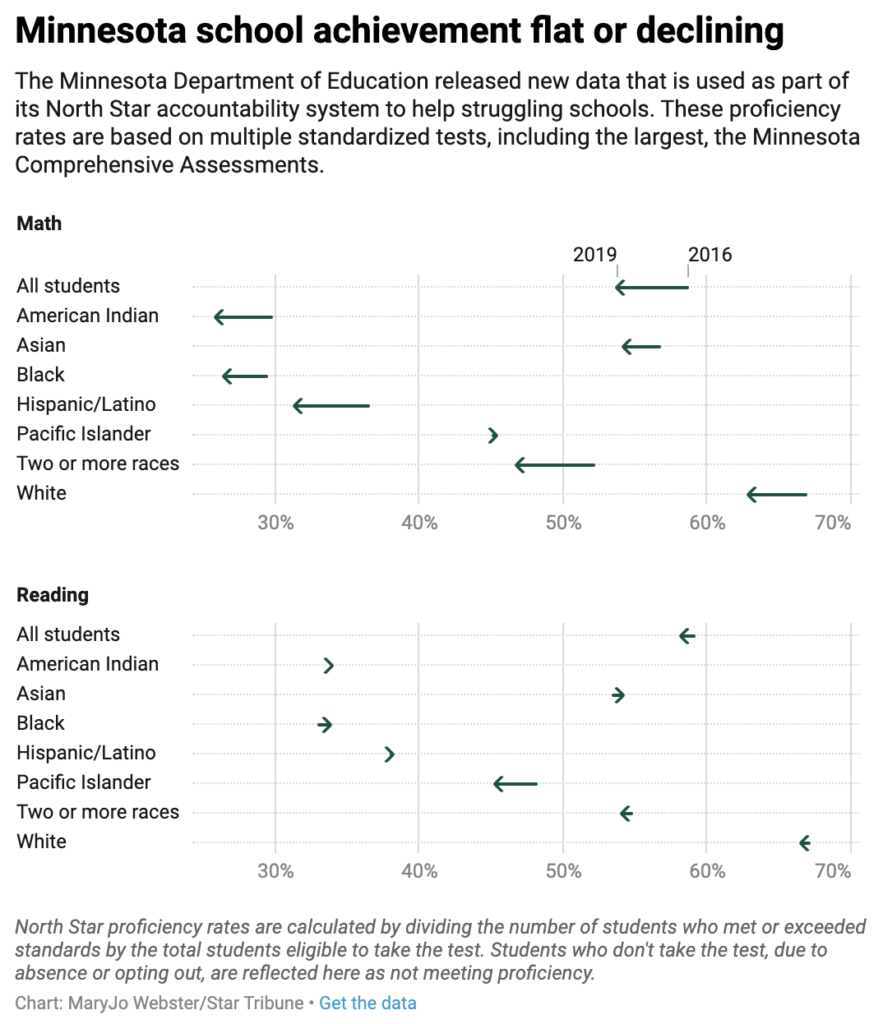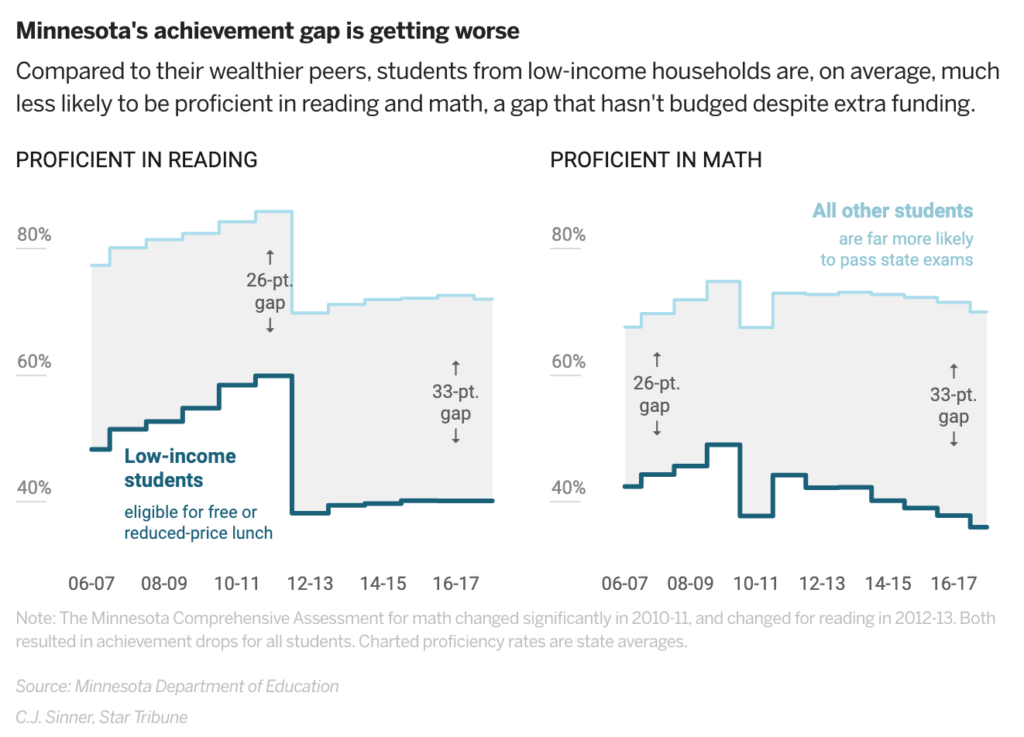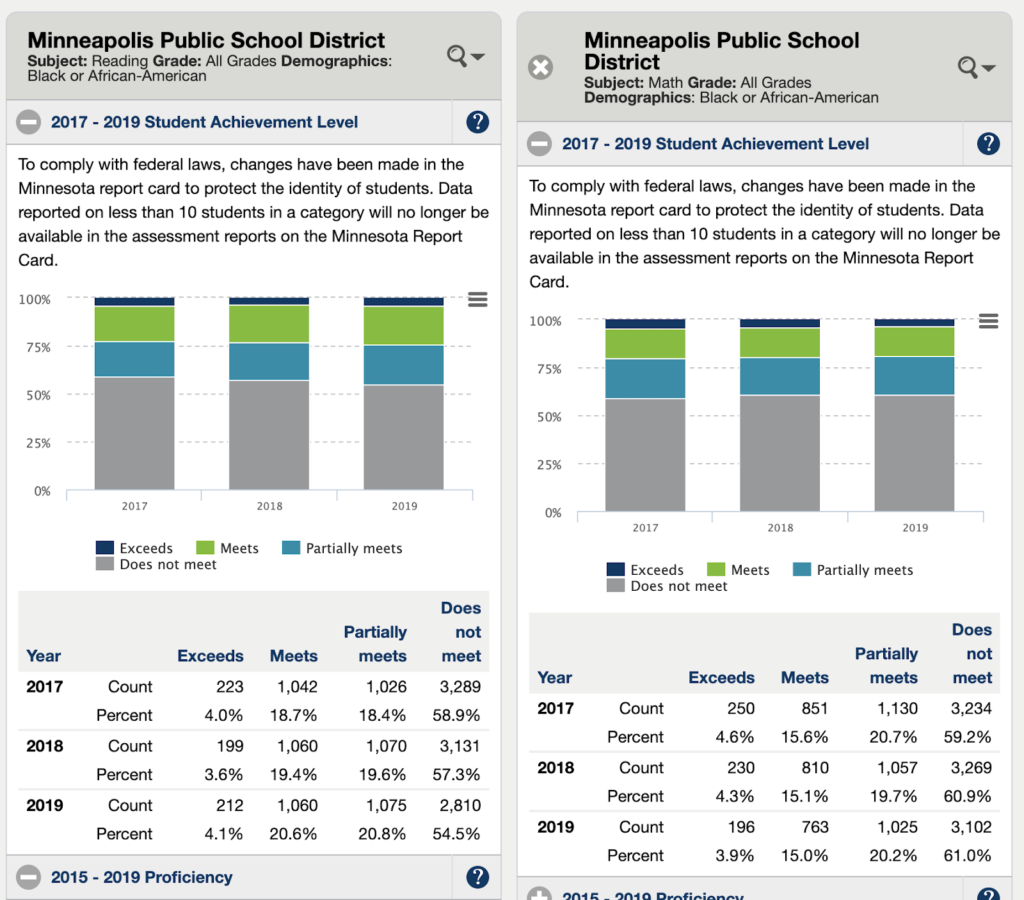
Sep 16, 2019 12:00:00 AM
Wherever you live, there is a high probability that Minnesota is low-key superior to your state.
We are the safest state in America, we have the best-rated healthcare facility in the country, the sixth-best job market, and the third-highest median income. Drawing upon “thousands of data points,” U.S. News and Weekly Report named Minnesota the third best state in the union. And, following that lead, CNBC Markets lists us as third in quality of life and education.
If you were going to inquire about how the children are doing in any place in America, surely this would be the place to do it.
We rock so hard.
And yet, there is a problem we live with, so dark and depressing that our Skandasotan stoicism stops us from speaking its name.
I’d have called it the soft bigotry of low expectations were I not stubborn about calling things what they are, and in this case, it’s the cold racism of White liberalism.
Amidst all our boom there is an unmistakable bust: The 34% of our students who are non-White, the 36% who qualify for free or reduced-price lunch, and the 8% who are English-language learners are suffering educational malpractice in our public schools.
It’s not for lack of good intentions or the lack of putting our money where our mouths are. You’ve never met a more affable contingent than these good citizens of Wobegon, and you’re unlikely to find a citizenry more willing to tax themselves for better schools. We believe in civic systems and take a communal attitude toward maintaining them.
It starts at the top. Our governor, Tim Walz, bills himself as the “teacher-governor” and says he wants Minnesota to be the “education state.” He trumpets his increases to our general education funding formula (as did his predecessor for eight years), boosting early education funding, and increasing mental health services in schools.
The guy is swell. You betcha.
Walz’ education commissioner (also a teacher and former number two to the American Federation of Teachers’ Randi Weingarten) released all manner of fancy numbers to explain our state’s education results for last year. Those numbers came with instruction for journalists to not focus on test scores, but to look on the bright side: more kids graduated, more participated in schools, more took ACT exams, etc. Please don’t focus on the fact that in reading, science and math, [pullquote]our students’ proficiency has either been stagnant or decreased for the past four years straight.[/pullquote]
Reading schmeading.
The Star-Tribune bucked the commissioner and published the truth. It’s ugly.
Here’s their picture of it:

This past June the StarTribune published a story indicating the state’s funding to help districts improve student achievement doubled to $600 million annually, but the gap not only didn’t improve, it widened significantly.
See here:

Though our commissioner pointed to increasing high school graduation rates as a clear success, a local advocacy campaign is running billboards that say we place 50th out of 50 states for African American graduation, and 49th for American Indian graduation.
In Twin Cities public schools, the damage is starker.
In Minneapolis, 76% of Black students fail in reading proficiency compared to just 21% of White students. And 81% of Black students in Minneapolis come up short on math tests.

Not to be outdone, across the river in St. Paul 81% of Black students aren’t math proficient, and 75% fail to meet standards in reading.
Blame poverty, fight reform, focus on the feelings of our White, female, middle-class teaching force rather than a racial mismatch of that teaching force (97% of Minnesota teachers are White), and latch on to every narrative that absolves the schools and their bargaining units from any expectation of improved results.
And, when that fails, there is another handy strategy you’ve probably seen in your own state: Blame charter schools and segregation. That’s literally the case in Minnesota, as the state has been sued by those alleging that it and many of its predominantly Black and Latinx charter schools have enabled school segregation across the Twin Cities metro area, and consequently, denied students of color their right to an adequate education under the state constitution.
Charters here are a popular option for parents seeking smaller schools that are safe and culturally affirming, and our sector is unique in that it has many schools that grew out of the need in ethnic communities—American Indian, Hmong, Somali, African America and Latinx—to find safe harbor from White-normed and culturally incompetent district schools.
While charter schools I’ve seen in other states are critiqued for being “corporate,” test-prep chop shops, [pullquote position="right"]Minnesota is fertile ground for small, community-grown charters.[/pullquote] Some focus on alternative learning structures or knowledge-rich curriculum. Some purposely seek to enroll students who have dropped out of school and are two years behind. Some bring Montessori to economically depressed areas.
As far as I know, we are the only state with a teachers union that actually authorizes charter schools.
As the birthplace of charters, and an early adopter of integration magnet schools, you’d think we’d be proud of our accomplishments on one hand, and humbled by our defeat on the other (our magnets face waning interest and our desegregation history has been bruising).
I’m not here to tell you all these schools are academically sound or that they are doing any better with test scores than the traditional schools. Yet, parents are drawn to them for reasons only the families themselves can know.
As smart, well-employed and college-educated as Minnesota is, you’d think we would not fall for scapegoating charters, or poor families, or Black and Brown neighborhoods for the racialized gaps in academic performance that live in our public schools.
At the top, I told you how we lead the nation in so many critical areas of life. Well, I didn’t tell you that for several years running, we’ve been listed as nearly the worst state for racial inequality.
Apparently [pullquote]Wobegon—America’s closest approximation of Finland—leads the nation in racism.[/pullquote]
When I say that we are the national capital of White progressive educational bullshit, I don’t mean to imply we aren’t nice about it. I only mean to say that “Minnesota nice” is the vaping of state personalities, and if you’re not careful we might nice your Black ass to death.
An award-winning writer, speaker, and blogger, Chris Stewart is a relentless advocate for children and families. Based in outstate Minnesota, Chris is CEO of brightbeam, a nonprofit media group that runs campaigns to highlight policies and practices that support thriving kids. He was the founding Director of the African American Leadership Forum, was an elected member of the Minneapolis Board of Education, and founded and served as the CEO of Wayfinder Foundation. Above all, Chris is a serial parent, a Minecraft enthusiast, and an epic firestarter on Twitter where he has antagonized the best of them on the political left and right. You’ll often see Chris blogging at citizenstewart.com and “tweeting” under the name “Citizen Stewart.”
Few issues in education spark more tension and debate than standardized testing. Are they a tool for equity or a burden on students? A necessary check on school systems or a flawed measure of...
Charter schools are public schools with a purpose. Operating independently from traditional school districts, they're tuition-free, open to all students, and publicly funded—but with more flexibility...
Despite the benefits of a diverse teaching force, prospective teachers of color fall out of our leaky preparation pipeline at every stage: preparation, hiring, induction, and retention. Here’s what...
Ed Post is the flagship website platform of brightbeam, a 501(c3) network of education activists and influencers demanding a better education and a brighter future for every child.
© 2020-2025 brightbeam. All rights reserved.
Leave a Comment